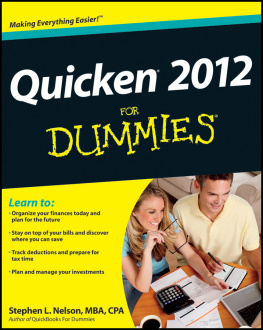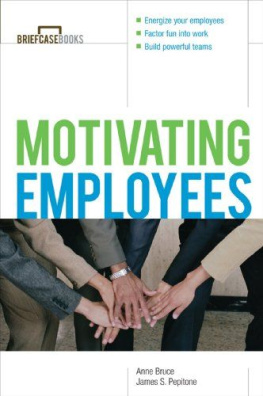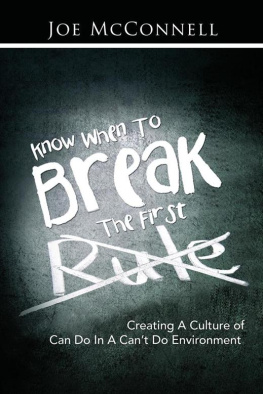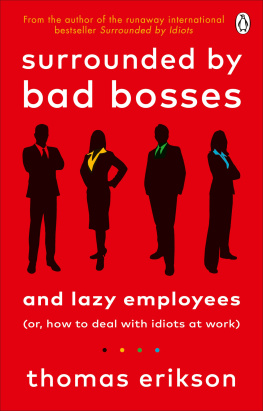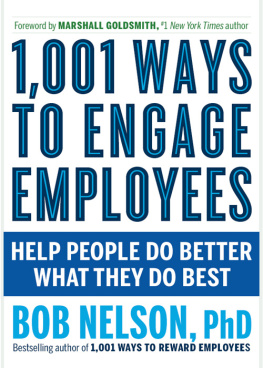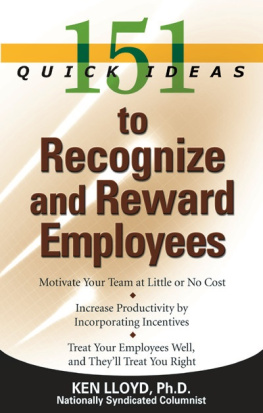OTHER BOOKS BY BOB NELSON
The 1001 Rewards & Recognition Fieldbook
1001 Ways to Energize Employees
1001 Ways to Take Initiative at Work
Keeping Up in a Down Economy
Ubuntu! An Inspiring Story About an African Tradition of Teamwork and Collaboration
The Management Bible
Please Dont Just Do What I Tell YouDo What Needs to Be Done!
Managing for Dummies, 3rd Edition
Motivating Todays Employees
Consulting for Dummies, 2nd Edition
Empowering Employees Through Delegation
Delegation: The Power of Letting Go
Decision Point: A Business Game Book
Exploring the World of Business
The Perfect Letter: A Guide to Better Business Letters
We Have to Start Meeting Like This: A Guide to Successful Meetings
Better Business Meetings
The Presentation Primer: Getting Your Point Across
Making More Effective Presentations
Louder and Funnier: A Practical Guide to Overcoming Stage Fright
The Supervisors Guide to Controlling Absenteeism
The Job Hunt: The Biggest Job Youll Ever Have
1501 WAYS TO REWARD EMPLOYEES
Low-Cost and No-Cost Ideas. Best Practices.
Latest Trends. Proven Strategies.
Ways to Motivate the Millennial Generation.
BOB NELSON, Ph.D.
Workman Publishing New York
Copyright 2012, 2005, 1994 by Bob Nelson
All rights reserved. No portion of this book may be reproduced mechanically, electronically, or by any other means, including photocopying without written permission of the publisher. Published simultaneously in Canada by Thomas Allen & Son Limited.
Library of Congress Cataloging-in-Publication Data is available.
eISBN 9780761171157
Cover and interior illustrations by Stephen Schudlich
Special thanks to KellyOCG for permission to draw from their white paper entitled Seven Seismic Shifts: Trends Shaking the HR Profession and Reshaping Strategic HR Value.
Workman books are available at special discounts when purchased in bulk for premiums and sales promotions as well as for fund-raising or educational use. Special editions or book excerpts can also be created to specification. For details, contact the Director of Special Markets at the address below, or send an e-mail to specialmarkets@workman.com.
Workman Publishing Company, Inc.
225 Varick Street
New York, NY 10014-4381
www.workman.com
At Zappos, we believe that if we get the culture right, most of the other stuff, including great customer service, will fall into place on its own. Long term, we want the Zappos brand to be about the very best customer service and the very best customer experience. This book gives readers ideas on how to inspire their employees to deliver the best performance every day for little or no cost.
TONY HSIEH, NEW YORK TIMES BESTSELLING AUTHOR OF DELIVERING HAPPINESS AND CEO OF ZAPPOS.COM, INC.

CONTENTS
TREND #1: Attracting & Retaining Talent:
The Growing Shortage of Skilled Workers
TREND #3: Everyones His/Her Own Boss:
The Rise of the Contingent Worker
TREND #5: The World Is Getting Smaller:
The Impact of Globalization
PART I
The New Realities
SECTION 1
THE RECOGNITION REVOLUTION
There are two things people want more than sex and money: recognition and praise.
Mary Kay Ash, Founder, Mary Kay, Inc.
Theres a revolution going on in todays workplaces. Workers want respect, and they want it now. They want to be trusted to do a good job; they want autonomy to decide how best to do it; they want to be asked their opinion and involved with decisionsespecially as those decisions affect them and their work; and they want to be supported, even if they make a mistake. Most important, they want to be appreciated when they do a good job.
These considerations are more important for todays employees than they were in previous erasor even five to ten years ago, for that matter. Providing workers with recognition and respect can make a world of difference in getting the best efforts out of them, keeping them, and helping you develop a reputation for treating employees in a way that helps attract talent to work for you and your organization.

What Is Recognition?
Recognition is a positive consequence provided to a person for a desired behavior or result. Recognition can take the form of acknowledgment, approval, or the expression of gratitude. It means appreciating someone for something he or she has done for you, your group, or your organization. It also can come in the form of asking someones opinion, involving them in a decision, or encouraging them in their career. Recognition can be given while an employee is striving to achieve a certain goal or behavior, or once he or she has completed it.
Employee recognition can be broken down into the following:
1. FORMAL RECOGNITION:A structured or planned program of recognition for desired performance. Examples include Presidents Award, Years of Service awards, and Employee of the Month awards. This recognition can be significant and symbolic, given the public forum in which it is typically presented.
2. INFORMAL RECOGNITION:A spontaneous gesture of sincere thanks for desired behavior or performance. Examples include: Creating a pass around trophy to acknowledge exceptional customer service; bringing in donuts or a pizza to celebrate a department success. These forms of recognition are increasingly more important to todays employees than formal recognition.
3. DAY-TO-DAY RECOGNITION:Daily feedback about positive employee performance. Examples include: Dropping by to tell someone good job on an assignment; a simple thank you in person or in front of others for a job well done. This is the ultimate form of recognitionits where the rubber meets the road in creating a results-oriented culture of recognition for your organization.
What Is a Reward?
Its an item or experience with monetary value (but not necessarily money) that is provided for desired behavior or performance, often with accompanying recognition. Harvard Business School professor and management consultant Rosabeth Moss Kanter defines a reward as something speciala special gain for special achievements, a treat for doing something above-and-beyond.
Why Isnt Money Enough?
When it comes to rewards, most managers think money is the top motivator for employees. While money is important to almost everybody, it is certainly not the only motivator. Todays employees value many other things where they work, and surprisingly, some of the top motivators, such as praise, involvement, and support, have the least financial cost. Monetary rewards such as salary, merit increases, bonuses, and the like are important, but seldom are they todays employees only motivators for making their best efforts on the job.
In a 2008 study by Maritz Research, the following anomalies about cash rewards were revealed:
Rewards that are strictly monetary are not as effective as non-cash-based items. Because they tend to be less personal, the opportunity to develop and grow interpersonal relationships is hindered.
Next page

